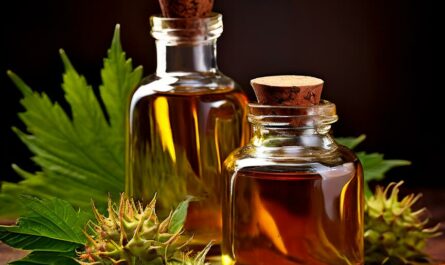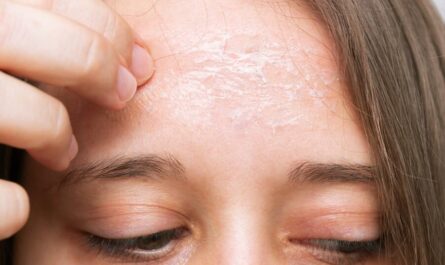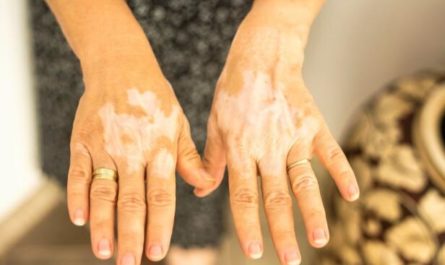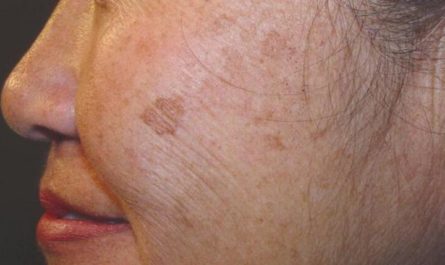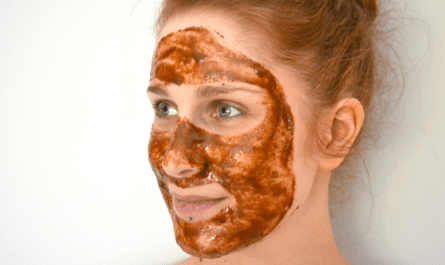Are you on a quest for radiant, youthful skin? Look no further than the world of essential oils! These natural elixirs have been used for centuries for their potent skincare benefits. From fighting wrinkles to fading dark spots, essential oils can be your secret weapon for achieving a flawless complexion. In this article, we’ll explore the 16 best essential oils for face serums. In addition, we will provide tips about how to incorporate them into your skincare routine.
Why Use Essential Oils for Facial Serums?
Before we dive into the star players, let’s discuss why essential oils are a game-changer for facial serums:
- Potent and Concentrated: Essential oils are highly concentrated plant extracts, packing a punch of beneficial compounds. Unlike synthetic ingredients, essential oils offer a gentle yet effective solution for all skin types.
- Natural and Gentle: Derived from nature’s bounty, essential oils are free from harsh chemicals and synthetic additives. This makes them a gentle and nourishing choice for even the most sensitive complexions.
- Multi-Taskers: From fighting acne to reducing inflammation, essential oils offer a wide range of skincare benefits. This makes them a versatile addition to any facial serum routine. Many essential oils possess multiple properties, such as being antimicrobial, anti-inflammatory, and anti-aging.
- Aromatherapy Benefits: Beyond their skincare prowess, essential oils also offer a delightful sensory experience. Their pleasant aromas can promote relaxation and create a spa-like ambiance in the comfort of your own home.
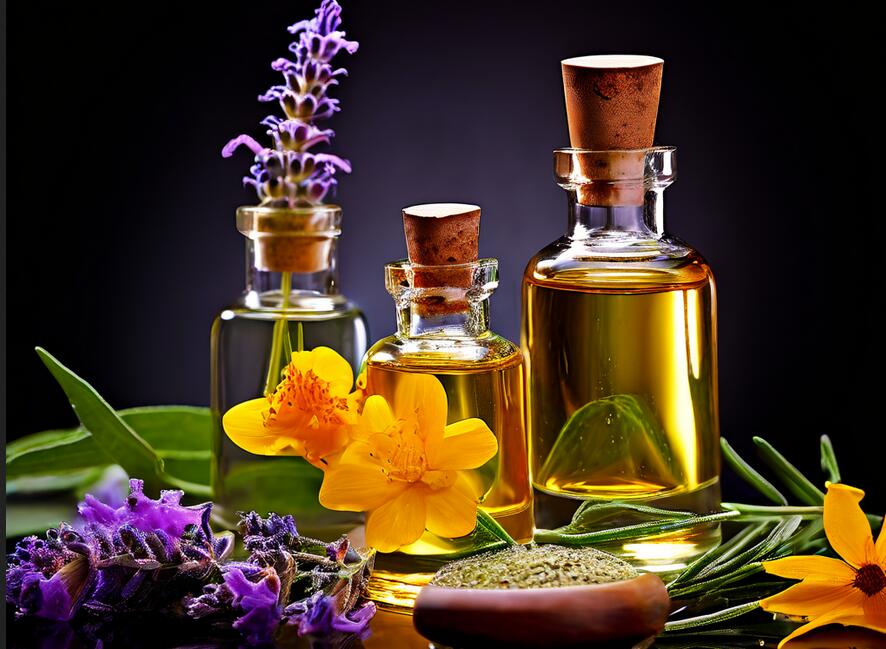
16 Best Essential Oils for Face Serum
Now, let’s explore the top 16 essential oils that should be on your radar for achieving a radiant, youthful complexion.
1. Rosehip Seed Oil
Aroma: Rosehip seed oil has a light, slightly nutty aroma.
Packed with vitamin C and essential fatty acids, rosehip seed oil is a powerhouse for combating signs of aging. It helps reduce the appearance of fine lines, wrinkles, and dark spots while promoting a brighter skin tone.
This oil is also rich in antioxidants, which help protect the skin from environmental stressors like pollution and UV damage. Rosehip seed oil is known for its ability to improve skin elasticity and promote collagen production. This makes it a valuable addition to any anti-aging serum.
In addition, Rosehip seed oil is also a natural source of vitamin A, which can help improve skin texture and promote cell turnover. This oil is easily absorbed by the skin. This makes it a great choice for those with dry or mature complexions.
2. Frankincense
Aroma: Frankincense has a warm, earthy, and slightly spicy aroma.
This ancient oil has been revered for its ability to tighten and lift the skin. Frankincense also has potent anti-inflammatory properties, helping to soothe irritated skin and reduce redness.
Its rejuvenating effects can help improve skin elasticity and promote a more youthful, radiant complexion. Frankincense is also believed to have astringent properties. This can help tighten pores and regulate sebum production.
Frankincense oil is rich in boswellic acid, a compound known for its ability to inhibit the breakdown of collagen and elastin. This oil can also help reduce the appearance of age spots and hyperpigmentation, promoting a more even skin tone.
3. Lavender
Aroma: Lavender has a fresh, floral, and slightly sweet aroma.
Renowned for its calming aroma, lavender oil is also a skincare superstar. It helps balance sebum production, making it an excellent choice for those with oily or acne-prone skin.
Lavender’s anti-inflammatory properties also make it a soothing choice for sensitive complexions. This versatile oil can also promote healing and reduce the appearance of scars and blemishes.
Lavender oil is rich in antioxidants, which can help protect the skin from environmental stressors. It can also help improve skin texture and reduce the appearance of fine lines and wrinkles.
4. Tea Tree
Aroma: Tea tree oil has a fresh, camphor-like aroma.
If you’re battling blemishes, tea tree oil should be your go-to. Its potent antibacterial and antimicrobial properties help fight acne-causing bacteria. This oil can also help regulate sebum production which is good for those with oily or combination skin. Tea tree oil is also known for its ability to reduce the appearance of scars and blemishes.
Tea tree oil is a natural antiseptic, making it an excellent choice for those with acne-prone skin. It can help dry out blemishes and prevent future breakouts by regulating sebum production and unclogging pores. However, it’s important to dilute tea tree oil properly, as it can be drying and irritating when used undiluted.
5. Geranium
Aroma: Geranium oil has a sweet, floral aroma with a hint of citrus.
This floral oil is a true multi-tasker. It helps regulate oil production, making it suitable for both oily and dry skin types. Geranium also has astringent properties that can tighten pores and promote a more even skin tone.
Its anti-aging benefits can help reduce the appearance of fine lines and wrinkles. Geranium oil also has anti-inflammatory properties, making it a soothing choice for irritated or inflamed skin.
Geranium oil is rich in antioxidants, which can help protect the skin from environmental stressors and promote a more youthful appearance. It is also known for its ability to promote cell regeneration.
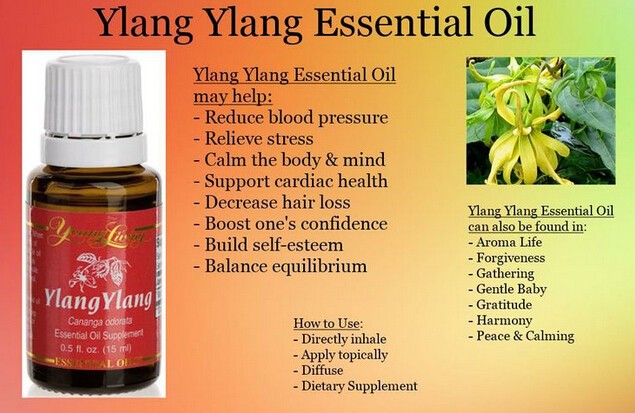
6. Ylang-Ylang
Aroma: Ylang-ylang oil has a rich, floral aroma with hints of fruity and slightly spicy notes.
Ylang-ylang oil is a hidden gem for those seeking a radiant complexion. Its ability to balance sebum production and promote cell regeneration makes it an excellent choice for combating dullness and uneven skin texture.
This oil is also known for its soothing properties, making it a great addition to a relaxing evening skincare routine. Ylang-ylang oil is rich in antioxidants. This can help protect the skin from environmental stressors and promote a more youthful appearance.
Ylang-ylang oil is also known for its ability to promote skin elasticity and improve the appearance of fine lines and wrinkles. It can help improve skin tone and texture.
7. Carrot Seed
Aroma: Carrot seed oil has a warm, earthy aroma with a hint of spice.
Rich in vitamins A and C, carrot seed oil is a potent antioxidant that helps protect the skin from environmental stressors. It also has a rejuvenating effect, helping to reduce the appearance of fine lines and wrinkles.
This oil can also help improve skin elasticity and promote a more even, radiant complexion. Carrot seed oil is known for its ability to promote cell regeneration and improve skin texture. This makes it a valuable addition to any anti-aging serum.
Carrot seed oil is also a natural source of beta-carotene, which can help improve skin tone and promote a healthy glow. It can also promote wound healing and reduce the appearance of scars and blemishes.
8. Neroli
Aroma: Neroli oil has a sweet, floral aroma with hints of citrus.
Derived from bitter orange blossoms, neroli oil is a luxurious addition to any facial serum. Its soothing and hydrating properties make it an excellent choice for dry, mature skin, while its uplifting aroma can promote a sense of calm and relaxation.
Neroli oil is also known for its ability to improve skin elasticity and reduce the appearance of fine lines and wrinkles. This oil is rich in antioxidants and can help protect the skin from environmental stressors.
Neroli oil is also known for its ability to promote cell regeneration, which can help improve skin texture and reduce the appearance of fine lines and wrinkles. It can also help improve skin tone and promote a more even complexion.
9. Sandalwood
Aroma: Sandalwood oil has a warm, woody aroma with a hint of sweetness.
Sandalwood oil is a true gem for those with oily or acne-prone skin. Its astringent properties help regulate sebum production, while its anti-inflammatory effects can soothe irritation and redness.
This oil is also known for its ability to promote a more even skin tone and reduce the appearance of blemishes and scarring. Sandalwood oil has a grounding, earthy aroma that can promote relaxation and a sense of calm.
Sandalwood oil is also known for its ability to promote wound healing and reduce the appearance of scars and blemishes. In addition, It can help improve skin texture and promote a more even complexion.
10. Chamomile
Aroma: Chamomile oil has a sweet, herbaceous aroma with a hint of apple-like notes.
Gentle chamomile oil is a godsend for those with sensitive skin. Its anti-inflammatory and soothing properties can calm redness and irritation.
Chamomile oil can also promote healing and reduce the appearance of scars and blemishes. This oil has a soothing, herbaceous aroma that can help promote relaxation and reduce stress.
Chamomile oil is also known for its ability to promote cell regeneration. It can help improve skin texture and reduce the appearance of fine lines and wrinkles. In addition, It can help improve skin tone and promote a more even complexion.
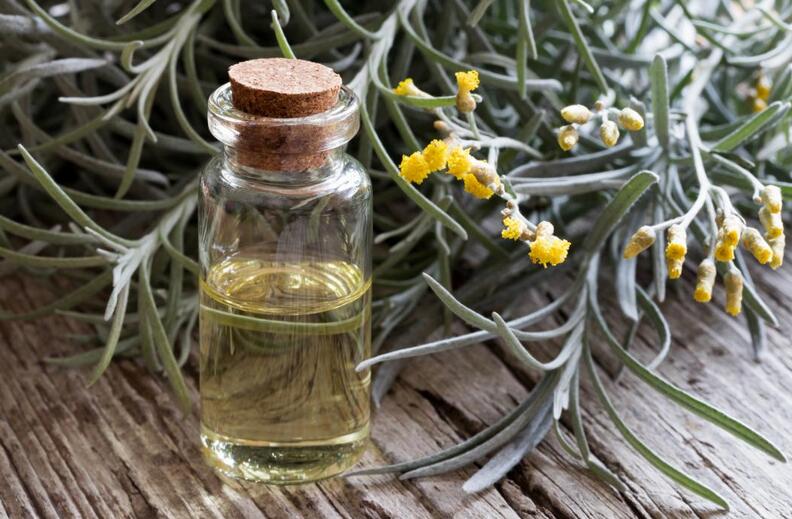
11. Helichrysum
Aroma: Helichrysum oil has a warm, earthy aroma with a hint of honey-like sweetness.
Often referred to as the “immortal flower,” helichrysum oil is a potent anti-aging ally. It helps promote cell regeneration, reduce the appearance of fine lines and wrinkles, and improve skin elasticity.
This oil is also known for its ability to soothe inflammation and promote healing. Helichrysum oil has a warm, earthy aroma that can promote a sense of grounding and relaxation.
Helichrysum oil is also known for its ability to promote wound healing and reduce the appearance of scars and blemishes. In addition, It can help improve skin texture and promote a more even complexion.
12. Patchouli
Aroma: Patchouli oil has a rich, earthy aroma with hints of musky and slightly sweet notes.
Patchouli oil is a versatile addition to any facial serum. Its anti-inflammatory and antimicrobial properties make it an excellent choice for those with acne-prone or irritated skin.
This oil can help improve skin elasticity and promote a more even skin tone. In addition, Patchouli oil is rich in antioxidants and can help protect the skin from environmental stressors.
Patchouli oil is also known for its ability to promote cell regeneration. This can help improve skin texture and reduce the appearance of fine lines and wrinkles.
13. Clary Sage
Aroma: Clary sage oil has a warm, herbaceous aroma with a hint of nutty and slightly fruity notes.
Clary sage oil is a true multitasker for those with oily or combination skin. It helps regulate sebum production. Its astringent properties can tighten pores and promote a more even skin tone.
This oil is also known for its ability to soothe inflammation and promote healing, making it a great choice for those with acne-prone or irritated skin. Clary sage oil has a warm, herbaceous aroma that can promote a sense of relaxation and well-being.
In addition, Clary sage oil is also known for its ability to promote cell regeneration. It can also help improve skin tone and promote a more even complexion.
14. Myrrh
Aroma: Myrrh oil has a warm, resinous aroma with a hint of spice.
Myrrh oil has been used for centuries for its potent skincare benefits. Its anti-inflammatory and antimicrobial properties make it an excellent choice for those with acne-prone or irritated skin. Its ability to promote cell regeneration can help reduce the appearance of fine lines and wrinkles.
Myrrh oil has a warm, resinous aroma that can promote a sense of grounding and relaxation. In addition, it is also known for its ability to promote wound healing and reduce the appearance of scars and blemishes. It can help improve skin texture and promote a more even complexion.
15. Cedarwood
Aroma: Cedarwood oil has a warm, woody aroma with a hint of sweetness.
Cedarwood oil is a fantastic choice for those seeking a more even skin tone. Its astringent properties help tighten pores and regulate sebum production, while its anti-inflammatory effects can soothe irritation and redness.
This oil is also known for its ability to promote healing and reduce the appearance of scars and blemishes. Cedarwood oil has a warm, woody aroma that can promote a sense of grounding and relaxation.
In addition, Cedarwood oil can help improve skin texture and reduce the appearance of fine lines and wrinkles. It can also help improve skin tone and promote a more even complexion.
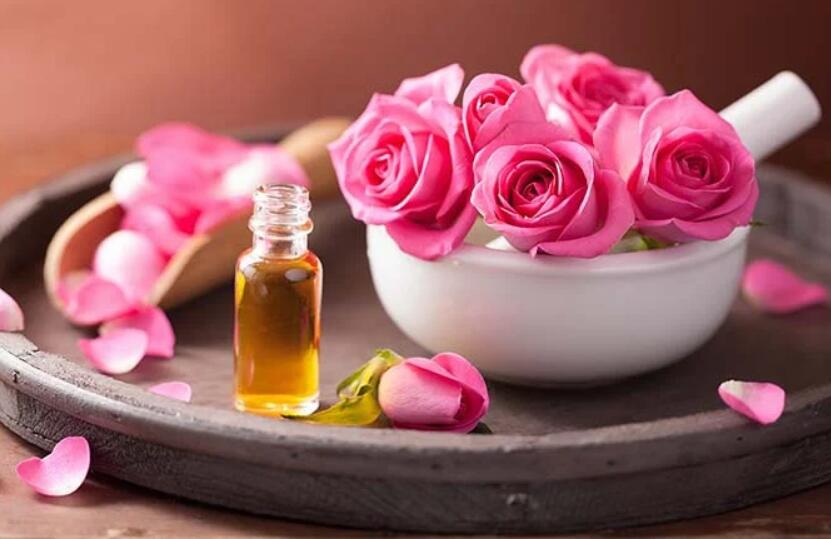
16. Rose
Aroma: Rose oil has a rich, floral aroma with a hint of sweetness.
Last but certainly not least, rose oil is a luxurious addition to any facial serum. Its hydrating and rejuvenating properties make it an excellent choice for dry, mature skin. Its uplifting aroma can promote a sense of calm and relaxation.
Rose oil is also known for its ability to improve skin elasticity and reduce the appearance of fine lines and wrinkles. This oil is rich in antioxidants and can help protect the skin from environmental stressors.
Rose oil is also known for its ability to promote cell regeneration. This can help improve skin texture and reduce the appearance of fine lines and wrinkles.
Safety Precautions: How to Use Essential Oils in Your Facial Serum?
Now that you’re familiar with the best essential oils for facial serums, it’s time to learn how to incorporate them into your skincare routine. Here are some tips to get you started:
1. Dilute, Dilute, Dilute
Essential oils are highly concentrated and should always be diluted in a carrier oil or serum base before applying to the skin. A general rule of thumb is to use 3-5 drops of essential oil per ounce of carrier oil or serum base. However, some oils may require higher or lower dilution rates, so it’s important to research the specific oil you’re using.
2. Start Slow
When introducing a new essential oil to your routine, start with just a few drops and gradually increase the amount as your skin adjusts. This will help you avoid any potential irritation or adverse reactions. It’s also a good idea to introduce one new oil at a time. So you can monitor your skin’s reaction.
3. Patch Test
Before using a new essential oil, perform a patch test on a small area of the skin to check for any allergic reactions or sensitivities. Wait 24-48 hours before applying the oil to your entire face. This is especially important if you have sensitive skin or a history of allergies.
4. Combine Wisely
Some essential oils work better in combination than others. Do your research or consult with a professional to create the perfect blend for your skin type and concerns.
For example, combining geranium and frankincense can create a powerful anti-aging serum, while tea tree and lavender can work wonders for acne-prone skin. However, be cautious when combining certain oils, as some combinations may cause irritation or adverse reactions.
5. Store Properly
Essential oils should be stored in dark, airtight containers, away from heat and direct sunlight to preserve their potency and prevent oxidation. Glass bottles with droppers are ideal for storing and dispensing essential oils.
6. Use Caution During Pregnancy
While many essential oils are generally considered safe, it’s always best to consult with your healthcare provider before using them during pregnancy. Some oils, such as clary sage and jasmine, should be avoided during pregnancy due to their potential effects on hormones.
7. Consider Your Skin Type
When selecting essential oils for your facial serum, consider your skin type and specific concerns. For example, if you have oily skin, you may want to focus on oils with astringent properties, such as geranium or cedarwood. If you have dry skin, hydrating oils like rose or neroli may be more suitable.
Conclusion
Essential oils are truly nature’s gift to our skin. By incorporating these potent elixirs into your facial serum routine, you can unlock a world of radiance, youthfulness, and overall skin health. Remember, a little goes a long way, so start slow and enjoy the journey to your most glowing complexion yet!

